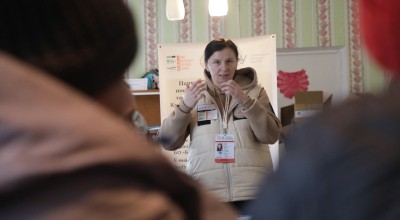
Read our 2024 annual report

Knowledge Hub
Across the globe, droughts and floods have almost doubled since the early 1990s. This March 13, we're asking you to Go Green to help families who are on the front line of the climate crisis. Here, Clare Ahern shines a spotlight on Niger, just one of the countries where your support could make all the difference.
Climate, hunger and the lean season in Niger
Underneath a scorching hot sun, the temperature is soaring to over 45 degrees as I talk to Mahamadou Islam Garmazaye. He is the Chief of Garmazaye village, in the Tahoua district of Niger. He explains the problems his community has been experiencing.
“We have not gotten enough rain. It's been about 5 years since the harvest has been good.”
As he talks, he points to the patch of red, dusty earth behind us. It takes me a few moments to realise that this is where crops should have been growing. It is difficult to imagine anything ever growing here. But it hasn’t always been this way. In fact, Mahamadou cannot remember any other period in his lifetime where the rainfall has been so consistently minimal, the ground so dry or the crops so poor.
This is the first time we've gone five years without a good harvest. In the past, this village had a good reputation for producing millet. The harvest was always good. But these last five years it's been very bad. People are suffering.
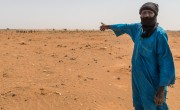
The lean season
Agriculture in a hot, dry country like Niger is always going to be challenging. Every year, the country suffers what is known as ‘the lean season’. This is the period between harvests when food stocks have run low but the next crops are not yet ready. But infrequent rainfall and rising temperatures have drastically affected crops in recent years, meaning there is less and less food to harvest when the time comes. This has stretched the lean season from three months to five months. People are now spending almost half their year struggling to put food on the table.
Apsatou's story
Apsatou Garba knows all about the challenges that the lean season brings. She calls it ‘Gadgé’. She tells me that every year, when their stocks of food run out, she, her husband and her two eldest children all go in search of casual labour.
“I’ll go to a farm. I’ll work for two, three, four days for them and at the end they’ll pay me some money. This money I will use to get something to eat for me and my family.”
During better times, Apsatou would divide her time between running her home, where she cares and cooks for her children, and helping her husband on the family’s small farm. The meals she prepares would generally consist of millet, maize or rice. The only vegetables her family have to eat are tomatoes or red peppers. It is a limited diet but they have enough to eat two meals a day.
When the lean season comes, everything changes. Apsatou will try to leave some small amount of food every day with her mother-in-law, who cares for the two young children, while the rest of family go in search of work. They sometimes have to travel long distances, and finding work is never guaranteed. If they don’t find any, they will have little or nothing to eat that night.
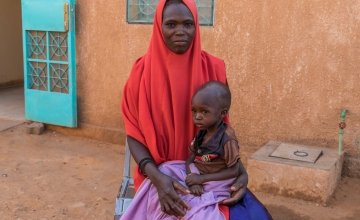
This year has been particularly tough for Apsatou’s family. Her little boy Tahirou, aged 2, fell ill and became severely malnourished. He lost a dramatic amount of weight and eventually stopped eating solid food. All he could consume was milk. Apsatou had to travel some 150 kilometres to bring him to the stabilisation centre in Tahoua hospital. The unit is supported by Concern Worldwide and it provides health care and nutrition support to children who are in a critical condition. It is where Apsatou and I talk as she sits on the bed that she shares with Tahirou while he receives the care he so urgently needs.
Malnutrition in Tahoua
Sadly, stories like Apsatou’s are common in this region of Niger.
Malnutrition rates in the Tahoua district are currently at 16.4%. This is above the emergency threshold. It signifies that at least one in every five households are experiencing large gaps in food consumption leading to acute malnutrition and sometimes death.
Rouaya’s story
Rouaya Zahirou’s story is a heart-breaking example of what happens to families on the margins of already vulnerable communities. Communities where one single setback can plunge a family into crisis. She lives in a village called Zardana Satourou, which is also in the district of Tahoua.
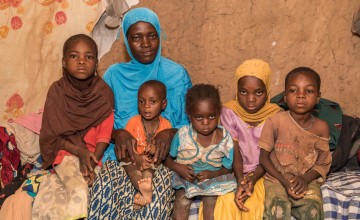
Rouaya’s husband developed a serious health issue which has prevented him from working, so the sole responsibility of finding food for the family rests on her shoulders. With five children to look after, she simply doesn’t have the freedom to work and the family have no land of their own to farm. In the past, they had rented a small plot of land which her husband tended when he was well. Now, Rouaya has to rely on the support of her family and her in-laws. But when everyone is struggling to get by, this support is very little. Sometimes, there is none at all.
I speak to Rouaya in her home. It’s a small clay structure, with enough space for just two single beds inside. Outside there is a small space enclosed by a wall woven from wood, and a single mat for the family of seven to sit on.
“Sometimes we have food, sometimes we have none”, she tells me.
Rouaya points to the family’s entire supply of food. It is a container of millet mixed with water. The mix resembles a milky drink, and it has to feed Rouaya’s entire family of seven. She will let her children eat first, followed by her husband, and if there is any leftover, she will have some for herself. When it is finished, they do not know where their next meal is coming from.
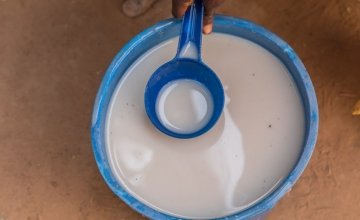
The children come and ask for food. When I say there is nothing, they start to cry.
The pain is etched across Rouaya's face as she elaborates.
“It is difficult for me to even talk about it… I feel very sad. I feel incapable. I try to be resilient. If I don't have food, there is nothing I can do.”
Although she feels incapable, her resilience is clear to see as she puts her whole family before herself. She has simply been placed in an impossible position. Her one-year old son Salouhou has become increasingly weak and underweight over time. Rouaya says he has been unwell for most of his life. She cannot remember a time when he was well.
Community Health Volunteers
As we talk, Rouaya is due to bring her little boy to a nearby health facility. She was referred to their nutrition programme by a Concern trained Community Health Volunteer, Chawada Aboubacar, who assessed Salouhou and feared he was severely malnourished.
Before receiving a visit from Chawada, Rouaya had not previously been aware of the nutrition support Salouhou could receive there. This is one of the many reason why Concern trains health volunteers. As well as helping to identify malnutrition amongst children in their community, they can refer suspected cases for immediate screening. They also help to inform families about good nutrition and hygiene practices, helping to boost the overall health of their fellow community members.
Nutrition support
As I accompany Rouaya to the health centre, she is nervous of what the outcome will be for her little boy. She is devastated to hear that he is severely malnourished. This means that without treatment, he would be at risk of death. Thankfully the centre, supported by Concern, run a nutrition programme and Salouhou is immediately put on a course of emergency therapeutic food.
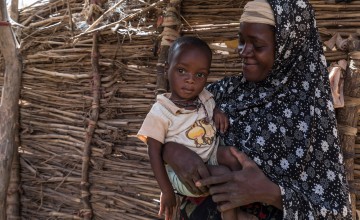
Rouaya’s relief is palpable as her little boy is handed his first sachet of the peanut paste. While initially cautious, Salouhou soon begins to eat it enthusiastically, and Rouaya begins to smile as she watches over her little boy.
“It's hard for me to express. I'm very happy to have the support of the nutrition centre. I don't know what I would do without it. There are no other choices for me”, she says.
Back in the stabilisation centre, little Tahirou is currently on the same course of therapeutic food. His mother, Apsatou, is equally relieved to see the care that he is getting.
I love my child, I love my family, so if you are facing this kind of situation, if Concern was not here, you are prepared to sell everything you have, even your bed, everything in your home, you will sell it to be able to pay for help for your children.”
Bridging the gap
In Zardana Satourou village, I also meet Chawada Aboubacar, the volunteer who referred Rouaya’s little boy for urgent screening and treatment. She is participating in a vegetable garden project.
The project provides drought resistant seeds, tools and training to women so that they can grow vegetables to consume when their stocks of food run out. It also helps to bring a variety of nutrients into the household diet.
Chawada explains that when their harvest runs out, it is a struggle to put enough food on the table every day.
“We have one meal in the morning. Then I have to go to try to get something for lunch. After that, we have to wait until the next day to eat again.”
Chawada is standing in front of the vegetable garden plots which provide a flourish of green amidst the arid landscape that surrounds outside. She thinks taking part in the project will be a huge help in bridging that gap for her family.
“We are growing Tomato, onions, cabbage and carrots and salad”, she says.
I can see that when the vegetables are ready it will help. This garden helps me and my family. It makes me happy.
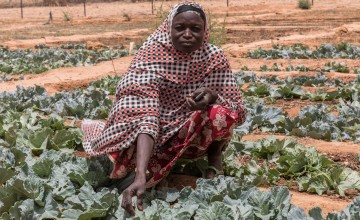
Cash transfers and food supplies
Back in Garmazye village, I meet two women who are attending a monthly distribution of cash and fortified flour.
Gaichatou Mohamed has six children. Her family has been hit hard by the five years of poor harvests that the village has experienced.
“Our harvest was not good. We got nothing from it this year. After harvest, what we collect can last for months, but this year, we have nothing”, she explains.
Her husband has been forced to leave the country in search of work. This is a common occurrence in Niger, when all other options have run out. He sends money back when he can, but the food it buys is not enough to feed the whole family. Gaichatou’s youngest child, Hadizatou, has become moderately malnourished. But she is in good spirits when we talk because she has just received a cash transfer which will allow her to buy a sack of rice, a sack of millet as well as some beans and some oil for cooking. It will be enough to feed her family for the next three weeks.
She has also received a bag of flour for Hadizatou which has been enriched with minerals like iron and zinc which will help to improve her nutrition.
This is the third distribution of the flour that the family has received and Gaichatou believes it is doing the world of good for her little girl.
“She likes it. When she is eating it she is smiling and calling my name. I think it is making her healthier.”
Only families with children under the age of five receive the fortified flour as this is the age group that is most vulnerable to malnutrition.
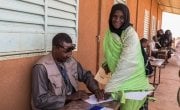
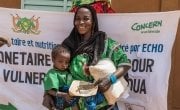
Helping to avoid hunger
Bali Abdacar’s children are all grown up so her household is receiving the cash transfer only. They too have suffered a poor harvest this year and are struggling to get by. Bali says that the food she will buy with the cash will last for up to 27 days. It means that the family can hold onto whatever assets they have left, including their goat which is a vital source of milk.
Bali is hugely grateful for the support.
Thank you. By the name of God, thank you. A person who helps you avoid being hungry, we have to say only thank you.
Go Green on March 13
Green jumpers, green cakes, green nails, green shoes – no matter how green you go, the money you raise will help transform communities affected by climate change.



